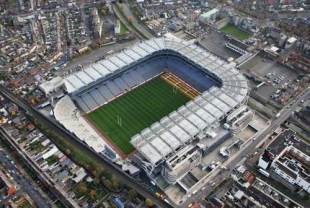|
Ireland v New Zealand
All Blacks ready for Croke Park bow
NZPA
November 14, 2008

An aerial view of Croke Park that will play host to Ireland and the All Blacks this weekend
© Getty Images
Enlarge
The All Blacks are practising their worst case scenarios to mentally prepare for an assumed Irish onslaught during Sunday's historic rugby test at Croke Park. Rugby may be only be a relative newcomer to a stadium regarded as a cradle of Irish indigenous sports, but it is apparent the cacophony of noise generated by an 82,000 sellout can be distracting for visiting teams and lift the Irish to new heights. England realised this in February last year as they suffered a record 30-point defeat when playing Ireland in one of the more poignant sporting contests held in the republic. That a Six Nations match could be held at the headquarters of the Gaelic Athletics Association (GAA) was remarkable, 87 years after British soldiers stormed the ground and mowed down spectators and Gaelic football players on what became known as the War of Independence's Bloody Sunday. The All Blacks have caused a milder form of heartache during 103 years of one-sided rugby rivalry with the Irish. And although their first experience at Croke Park does not have any political overtones, the team and management anticipate an Irish side desperate to end a 21-test winless streak. "This will be a unique experience for some of the guys," said assistant coach Wayne Smith before explaining the side's tailormade practice session. "You have to be realistic about what it's going to be like .... Croke Park, 80,000 people there, it's going to as big and as passionate an occasion as probably any of these players have come across." In an attempt to sharpen their thought processes Smith said the coaches posed `what if' scenarios at training and gauged how quickly the players responded to stress and pressure situations. "With the backs I try and put a whole heap of mental pressure on them, randomising training -- creating situations where they are liable to see errors," he said. "They've then got to cope and get themselves back on track. They're going to be under the pump at times and in those moments you need to regain your composure." Smith was happy with the outcomes, a positive sign as the All Blacks seek to clear the second hurdle to achieving a Grand Slam. The build-up has gone relatively smoothly since the best available team was named on Tuesday -- a lineup offering 618 caps worth of experience. The health of his baby son continues to distract Mils Muliaina but Smith reiterated the fullback was tuned in for his first match of the tour. Muliaina will be tasked with marshalling Joe Rokocoko and Sitiveni Sivivatu, the cousins still striving to rediscover their attacking prowess down the flanks. Daniel Carter is also facing his own challenge, having spent only half an hour's game time at first five-eighth since the Tri-Nations finale on September 13. New Zealand will need their playmaker and back three to hold up against opponents not entirely reliant on passionate support. All Blacks captain Richie McCaw had no doubt the Irish side contained more quality than Scotland, who were comfortably beaten 32-6 last weekend. He nominated captain Brian O'Driscoll, first five-eighth Ronan O'Gara and lock Paul O'Connell as the danger men. "O'Driscoll and O'Gara have played a lot of tests, they're smart players and if you give them good ball to operate with they have the ability to use it," he said. "In the second row O'Connell is another one of those characters. With guys like that scattered through a team they lift the players around them." Still, for all their talent the Irish face their own psychological issues as they seek to improve on their best result, a 10-10 draw achieved at Lansdowne Road in 1973. The All Blacks have won the other 11, including a 45-7 victory on their last visit to the Irish capital three years ago. Irish players, like the Scots before them, have spoken optimistically about finally ending a demoralising sequence of results. Their last three tests against the All Blacks have been paraded as a positive -- the biggest losing margin was 11 points -- an indication the gap is closing. But perhaps crucially they had the winning of each test in Hamilton, Auckland and Wellington, yet could not cross the line. © Scrum.com
|
Live Sports
Communication error please reload the page.
-
Football
-
Cricket
-
Rugby
-
- Days
- Hrs
- Mins
- Secs
F1 - Abu Dhabi GP
Abu Dhabi Grand Prix December 11-131. Max Verstappen ()
2. Valtteri Bottas (Mercedes)
3. Lewis Hamilton (Mercedes)
4. Alexander Albon ()
5. Lando Norris ()
6. Carlos Sainz Jr ()
-
ESPNOtherLive >>
Golf - Houston Open
Snooker - China Open
Tennis - Miami Open

